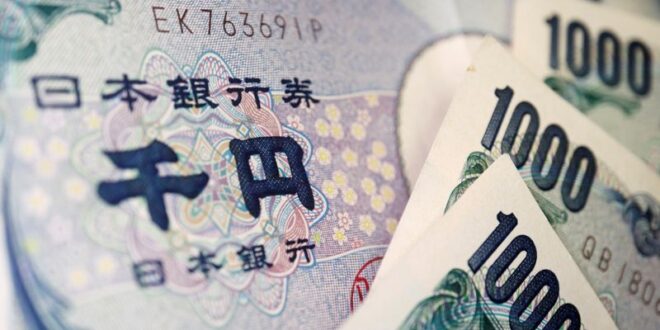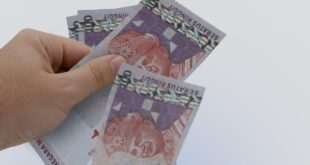THE success of Japan and South Korea at inserting language voicing concern over their currencies in a joint statement with the United States last week underscores the political heat they face from stiff inflation that is being aggravated by weak exchange rates.
The matter is all the more urgent with Middle East tensions threatening to push up oil prices and accelerate cost pressures that have already exacted a domestic political toll on both governments.
For the United States, the statement was a small price to pay to placate a pair of allies it needs to keep on board with a more strategic goal of containing China.
In the first trilateral finance dialogue since last year’s historic three-way leaders summit at Camp David, the United States, Japan and South Korea agreed last Wednesday to “consult closely” on currency markets, acknowledging “serious concerns” from Tokyo and Seoul over the slumping Japanese yen and South Korean won.
The US dollar has appreciated broadly this year on prospects for a delay in the US Federal Reserve’s shift to interest rate cuts, but the yen and won have weakened far more against the greenback than most other currencies.
On the heels of the statement, the yen rebounded as markets braced for the risk of intervention, with some traders flagging the possibility of coordinated action along the lines of the 1985 “Plaza Accord.”
The won stabilised as well.
“The fact such strong language was used in the statement is a huge accomplishment for Japan and South Korea, and underscores the deep ties among the three countries,” said Atsushi Takeuchi, a former Bank of Japan (BoJ) official.
“Given the recognition Washington gave to their concerns, it probably won’t get in the way if Tokyo or Seoul were to intervene in the currency market,” said Takeuchi, who was involved in Japan’s intervention in the market a decade ago.
Exchange rates, however, were just part of a long list of topics discussed during the finance dialogue, which was created under an agreement worked out at the trilateral summit outside of Washington last August.
Reflecting the summit’s focus on countering China’s growing presence in the Asia-Pacific region, the finance ministers vowed to collaborate against “economic coercion and over-capacity in key sectors” by other nations, in a thinly veiled warning to Beijing.
And yet the strong market attention the currency language drew was a political victory for Japan, where Prime Minister Fumio Kishida suffers from slumping approval ratings as the rising cost of living hits households.While big firms are offering bumper pay hikes this year, Japan’s inflation-adjusted real wages fell for a 23rd straight month in February as pay has yet to rise enough to compensate for the steady increase in prices.
The weak yen is particularly painful for a country like Japan, which is heavily reliant on imports of fuel and food.
Exchange-rate sensitivity
Cost-push inflation – or price pressures driven by production cost increases – has also been a political headache in South Korea.
Sticky inflation
President Yoon Suk Yeol’s party suffered a big defeat in legislative elections this month amid accusations that the administration had failed to curb inflation.
Bank of Korea governor Rhee Chang-yong said on Wednesday that sticky domestic inflation was among the factors that complicated the central bank’s decision on when to shift away from tight monetary policy.
“The pivot timing is tricky,” Rhee said at a seminar during the spring meetings of the International Monetary Fund and World Bank in Washington.
“We’d like to see more evidence that inflation is going down as we expect.”
Under pressure to slow the yen’s fall, Japanese officials spent considerable time in Washington trying to make the case for why they might need to intervene in the currency market.
Finance Minister Shunichi Suzuki said last Wednesday he explained Tokyo’s readiness to take appropriate action against excessive yen moves in a bilateral meeting with US Treasury secretary Janet Yellen.
The Group of Seven (G7) finance leaders also agreed to a Japanese proposal to reaffirm their commitment that excessive volatility and disorderly moves in the currency market were undesirable.
Ready to raise rates
BoJ governor Kazuo Ueda last Thursday signalled the central bank’s readiness to raise interest rates if the weak yen’s boost to inflation becomes hard to ignore.
“Both in Japan and South Korea, inflation is very elastic to exchange-rate moves,” Japan’s top currency diplomat Masato Kanda, who was involved in the drafting of the trilateral and G7 statements, told reporters last Wednesday.
“Because both countries import a lot in dollar terms, we’re more worried about exchange-rate volatility.” — Reuters
Leika Kihara writes for Reuters. The views expressed here are the writer’s own.
 BeritaKini.biz Berita Viral Terkini di Malaysia
BeritaKini.biz Berita Viral Terkini di Malaysia





